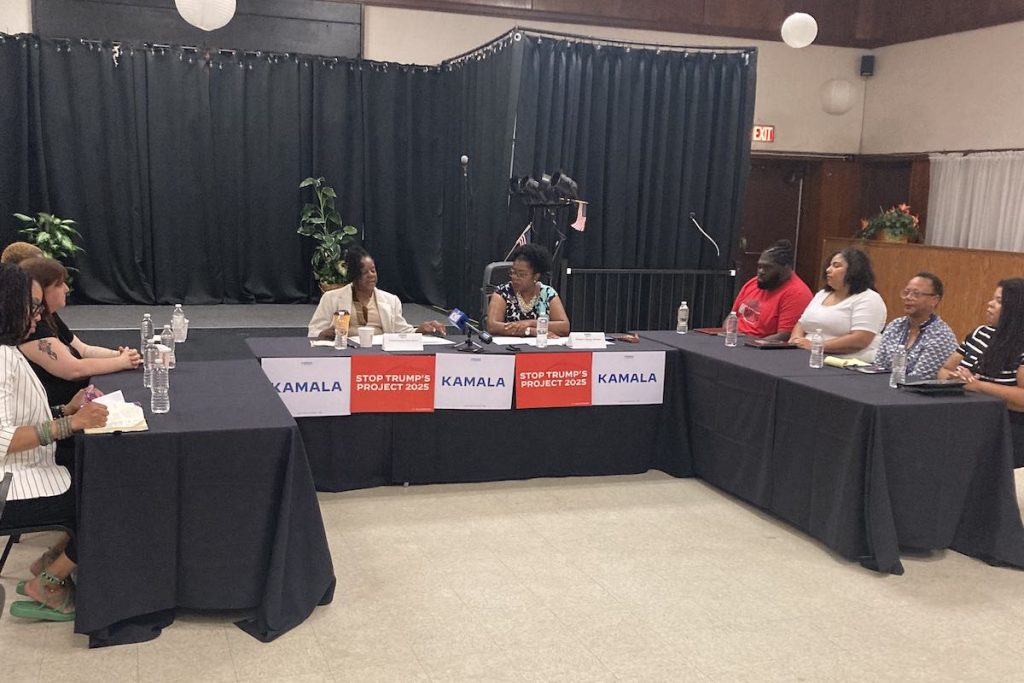Doulas and others laid out their policy suggestions for improving maternal health during an event held by Vice President Kamala Harris’ campaign Friday in Milwaukee.
“We know, without a shadow of a doubt, that doulas — your field — are the answer to helping to just make our outcomes for our Black moms better,” Sen. LaTonya Johnson, D-Milwaukee, said at the roundtable at the Wisconsin African American Women’s Center.
Johnson called for state lawmakers to extend postpartum Medicaid coverage from 60 days to a year. Legislation to do so passed the Senate last fall, but did not move forward in the Assembly, where Speaker Robin Vos, R-Rochester, opposes it.
Vanessa Johnson, a doula and doula trainer, supports the extension. She is the founding executive director of Birthworkers United, a nonprofit that focuses on bridging the gaps between the medical and emotional models of perinatal care, and runs A Miracle Happened Wellness and Birth Services.
“When I counsel new moms in the hospital, it’s like, ‘Yeah, you just had this baby yesterday, but I need you to watch these signs and symptoms for a full year,’” she said. “To not have that support from an insurance standpoint is really a disservice.”
Providing support and leave to fathers and non-birthing people to help new moms is critical, said Joshua Liston-Zawadi, a doula, executive director of Life Redefined and owner of Dad Doula.
“They both need leave,” he said.
Evelyn Ashley Comer, a doula, said diversifying the field is important.
“As a woman, when you walk into a space and you see another woman or you see a black woman — someone who looks like you — you automatically feel more comfortable,” Comer said. “You are more able to voice your concerns. It’s almost like you have this connection of like, ‘I see you and I got you.’”
Dalvery Blackwell, a maternal, infant health and reproductive justice advocate, is the executive director of the African American Breastfeeding Network, which provides training, support and education for birth workers.
Blackwell said pay equity for birth workers is currently “unacceptable.” She said they’re one of the organizations in the country with the highest reimbursement rate for advanced doulas, which is around $2,000 for prenatal care and postpartum support. She described that as “minimal” and believes an entry-level doula should be paid $2,000 to $3,000 per birth and advanced providers should be paid $5,000.
“We really should be seriously investing in the work that is priceless,” she said.
States that have Medicaid reimbursement for doulas have issues too, she said. Many are getting paid for months later, and data collection and administrative work are covered. Blackwell suggested a “braided system” for doula reimbursement because she doesn’t believe Medicaid has the funding to cover the services and should be combined with reimbursement from other entities, like hospital foundations.
U.S. Rep. Gwen Moore, D-Milwaukee, discussed legislation she supports that would require insurance to cover mental healthcare without cost-sharing for pregnant people and new moms, expand Medicaid to include doula and midwifery care, and modernize a grant program to support low-income workers seeking jobs in healthcare. Moore also highlighted parts of a plan released by Harris and the Biden administration for addressing maternal health.
This article first appeared in the Wisconsin Health News daily email newsletter. Sign up for your free trial here.
